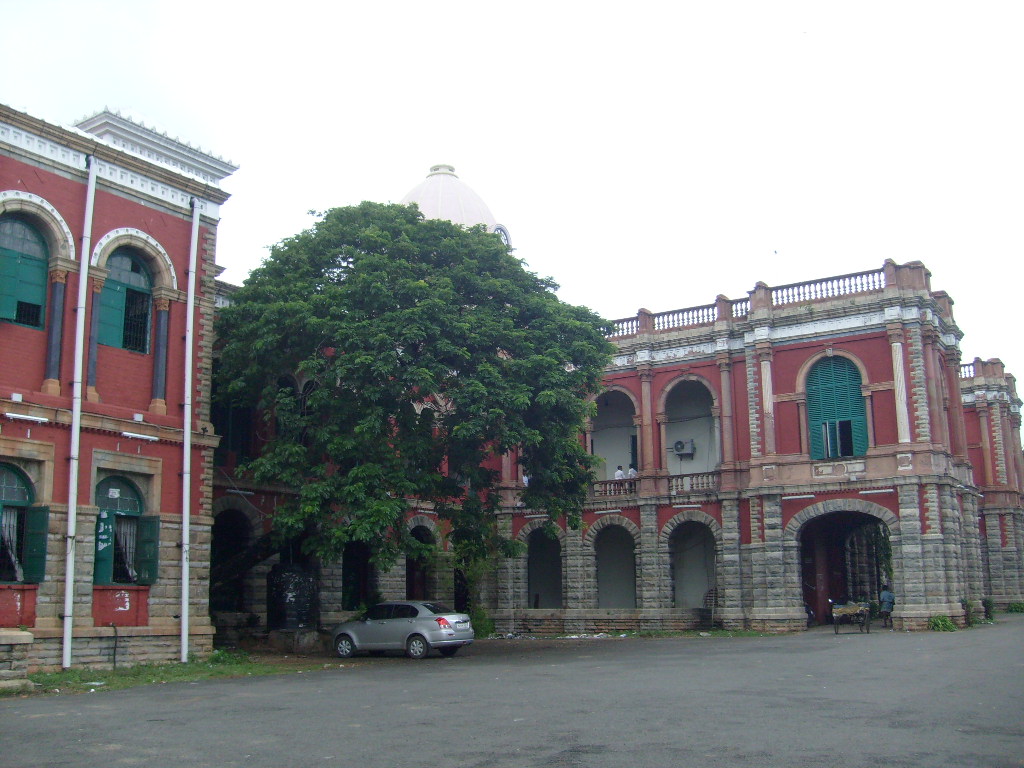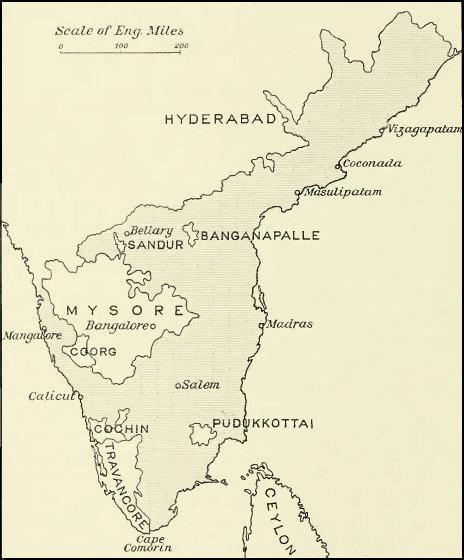|
Presidency College, Madras
Presidency College is an art, commerce, and science college in the city of Chennai in Tamil Nadu, India. On 16 October 1840, this school was established as the Madras Preparatory School before being repurposed as a high school, and then a graduate college. The Presidency College is one of the oldest government arts colleges in India. It is one of two Presidency Colleges established by the British in India, the other being the Presidency College, Kolkata. History Sir Thomas Munro asked for a Committee of Public Instruction to form in 1826. In 1836, the committee's duties changed to the "Committee of Native Education". The plans drawn up by the committee did not commend themselves to the Governor of Madras, Lord Elphinstone, who proposed nineteen resolutions that passed unanimously. Elphinstone chose E. B. Powell, a University of Cambridge Wrangler in mathematics, to be the first principal, and Powell accepted the post. He arrived in Mumbai (Bombay) on September 20, 1840, ... [...More Info...] [...Related Items...] OR: [Wikipedia] [Google] [Baidu] |
Mathematics
Mathematics is an area of knowledge that includes the topics of numbers, formulas and related structures, shapes and the spaces in which they are contained, and quantities and their changes. These topics are represented in modern mathematics with the major subdisciplines of number theory, algebra, geometry, and analysis, respectively. There is no general consensus among mathematicians about a common definition for their academic discipline. Most mathematical activity involves the discovery of properties of abstract objects and the use of pure reason to prove them. These objects consist of either abstractions from nature orin modern mathematicsentities that are stipulated to have certain properties, called axioms. A ''proof'' consists of a succession of applications of deductive rules to already established results. These results include previously proved theorems, axioms, andin case of abstraction from naturesome basic properties that are considered true starting points of ... [...More Info...] [...Related Items...] OR: [Wikipedia] [Google] [Baidu] |
Pudukkottai State
Pudukkottai was a kingdom and later a princely state in British India, which existed from 1680 until 1948. The Kingdom of Pudukkottai was founded in about 1680 as a feudatory of Ramnad and grew with subsequent additions from Tanjore, Sivaganga and Ramnad. One of the staunch allies of the British East India Company in the Carnatic, Anglo-Mysore and Polygar wars, the kingdom was brought under the Company's protection in 1800 as per the system of Subsidiary Alliance. The state was placed under the control of the Madras Presidency from 1800 until 1 October 1923, when the Madras States Agency was abolished, and until 1948 it was under the political control of the Government of India. Pudukkottai State covered a total area of and had a population of 438,648 in 1941. It extended over the whole of the present-day Pudukkottai district of Tamil Nadu (with the exception of Aranthangi taluk which was then a part of Tanjore district). The town of Pudukkottai was its capital. The ruler o ... [...More Info...] [...Related Items...] OR: [Wikipedia] [Google] [Baidu] |
Dewan Bahadur
Dewan Bahadur or Diwan Bahadur was a title of honour awarded during British rule in India. It was awarded to individuals who had performed faithful service or acts of public welfare to the nation. From 1911 the title was accompanied by a special Title Badge. Dewan literally means Prime Minister in Indian context and ''Bahadur'' means brave. This title was above Rao Bahadur title and people with Rao Bahadur could be elevated to status of Diwan Bahadur. Further, the Prime Ministers of Indian Princely States were known as Dewan/ Diwan. They were also given or promoted directly to the title of Dewan Bahadur by British authorities on being appointed Dewan, to suit their post. The Dewan Bahadur and other similar titles issued during British Raj were disestablished in 1947 upon independence of India. List of people with Dewan Bahadur title * R. Raghunatha Rao – Diwan of Indore State from 1875 to 1880 and 1886 to 1888. * R. Ramachandra Rao * N. Pattabhirama Rao * K. Rangachari ... [...More Info...] [...Related Items...] OR: [Wikipedia] [Google] [Baidu] |
List Of Diwans Of Mysore
The following lists the dalvoys and Diwans of the Kingdom of Mysore from the 18th century to the 20th. See also * List of chief ministers of Karnataka * Prime Minister of Hyderabad * List of Diwans of Travancore References {{Reflist External links Mysore, Princely States of India WorldStatesmen.org Kingdom of Mysore Diwans of Mysore Diwans of Mysore The diwan of Mysore, also spelled dewan of Mysore, synonymously the prime minister of Mysore, was the ''de-facto'' chief executive officer of the government of the Kingdom of Mysore and the prime minister and royal adviser to the Maharaja of My ... Mysore People of the Kingdom of Mysore ... [...More Info...] [...Related Items...] OR: [Wikipedia] [Google] [Baidu] |
Alagappa Chettiar
Sir Alagappa Chettiar (6 April 1909 – 5 April 1957) was an Indian businessman and philanthropist. He received the Padma Bhushan award (the third highest civilian award in India) in 1956. Early life Chettiar was born in Kottaiyur in the Sivaganga District of Tamil Nadu to K.V.AL. Ramanathan Chettiar and Umayal Achi. He attended Presidency College at Chennai, where he became friendly with Sarvepalli Radhakrishnan, a model teacher who later became President of India. In 1930 at the age of 21 he was the first M.A. (English Language and Literature) from the community of Nattukottai Nagarathars. After his graduation he went to England to study law. He qualified for the Bar at Middle Temple in England in 1933 and became a 'Bar-at-Law' in Chettinad. During that time he also earned a pilot certificate at Croydon, London, and became the first Indian trainee in the Standard Chartered Bank, London. Business acumen Chettiar's activities as a business entrepreneur were acknowled ... [...More Info...] [...Related Items...] OR: [Wikipedia] [Google] [Baidu] |
Institute Of Mathematical Sciences (Spain)
The Institute of Mathematical Sciences (Spanish language, Spanish: ''Instituto de Ciencias Matemáticas'' – ICMAT) is a mixed institute affiliated to the Spanish National Research Council (CSIC) in partnership with three public universities: the Autonomous University of Madrid (UAM), the Charles III University of Madrid (UC3M) and the Complutense University of Madrid (UCM). Founded in 2010, the ICMAT headquarters is located in the Cantoblanco Campus in Northern Madrid. The ICMAT is composed of the mathematicians belonging to the CSIC and researchers from the three Madrid universities. The structure and composition of the center was based on an initial selection carried out with the assistance of the National Agency for Public Education (Agencia Nacional de Evaluación y Prospectiva – ANEP) after a public call issued to all interested parties. Research at the ICMAT The ICMAT is an institute where work on a broad range of mathematics is conducted, including the transfer of know ... [...More Info...] [...Related Items...] OR: [Wikipedia] [Google] [Baidu] |
Alladi Ramakrishnan
Alladi Ramakrishnan (9 August 1923 – 7 June 2008) was an Indian physicist and the founder of the Institute of Mathematical Sciences (Matscience) in Chennai. He made contributions to stochastic process, particle physics, algebra of matrices, special theory of relativity and quantum mechanics. Early life Ramakrishnan was born on 9 August 1923 in Madras. His father was the lawyer Sir Alladi Krishnaswami Iyer, who, as a member of the Constituent Assembly, was instrumental in drafting the Constitution of India with other prominent members. He had his early education in P. S. High School, Madras. He graduated from Presidency College, Madras, with B.Sc. (Hons) degree in physics. As a student of the college he had wanted to work under Sir C. V. Raman. When his father consulted Raman, Raman suggested reading ''Lehrbuch der theoretischen Physik'' by Georg Joos. Ramakrishnan studied the book and developed an interest in theoretical physics and special relativity in particular. Caree ... [...More Info...] [...Related Items...] OR: [Wikipedia] [Google] [Baidu] |
Hindu Temple Society Of North America
The Hindu Temple Society of North America is a nonprofit organization that manages the Sri Maha Vallabha Ganapati Devasthanam temple in Queens, New York. It is known as the Ganesha Temple after its main deity. Consecrated on July 4, 1977, it was the second Hindu temple built by Indian immigrants to open in the United States. Uma Mysorekar has served as its president since 1994. Deities The central deity of the temple is Ganesha. The sacred images of Venkateswara, Lakshmi, Shiva, Parvati, Durga, Saraswati, Hanuman, Dakshinamurthy, Gayatri, Shanmukha, Valli, Devasena, Kamakshi, Navagraha, Nagendra Swamy, Raghavendra Swamy, Rama Parivar, Radha-Krishna, Khodiyar Mata, Ayyapa, Agastriyar, and Lopa Mudra, Satyanarayan and Rama Devi, Chandrasekaraswamy and Anandavalli, Atma Linga, Nataraja, Sivakami and Manikkavachakar, Swarna Bairavar, Sudarsana and Narasimha, Dhanvantari and Garuda, and Sridevi and Budevi have also been consecrated within the temple. History Before the Hindu Templ ... [...More Info...] [...Related Items...] OR: [Wikipedia] [Google] [Baidu] |
Alagappa Alagappan
Alagappa Alagappan (December 3, 1925 - October 24, 2014) was the founder of the Hindu Temple Society of North America. Early life Alagappan was born in Kanadukathan, India. Alagappan graduated with bachelor's and master's degrees from Presidency College in Chennai. Alagappan later received a master's degree from the London School of Economics and Political Science in international relations. Career In London, Alagappan worked for BBC. Remarkably, while working at BBC, Alagappan interviewed a pope. After working at BBC, Alagappan returned to India and became a journalist for ''The Hindu''. He went on to work at the United Nations in Bangkok and transferred to New York in 1961. Alagappan worked at the UN for 30 years and served as the deputy director of the natural resources and energy division. The Hindu Temple Society of North America Algappan, along with a few others, established the Hindu Temple Society of North America The Hindu Temple Society of North America is a no ... [...More Info...] [...Related Items...] OR: [Wikipedia] [Google] [Baidu] |
Presidency College Madras Maths Intermediates 1941
A presidency is an administration or the executive, the collective administrative and governmental entity that exists around an office of president of a state or nation. Although often the executive branch of government, and often personified by a single elected person who holds the office of "president", in practice, the presidency includes a much larger collective of people, such as chiefs of staff, advisers and other bureaucrats. Although often led by a single person, presidencies can also be of a collective nature, such as the presidency of the European Union is held on a rotating basis by the various national governments of the member states. Alternatively, the term presidency can also be applied to the governing authority of some churches, and may even refer to the holder of a non-governmental office of president in a corporation, business, charity, university, etc. or the institutional arrangement around them. For example, "the presidency of the Red Cross refused to support h ... [...More Info...] [...Related Items...] OR: [Wikipedia] [Google] [Baidu] |
The Madras Presidency College - Madras
''The'' () is a grammatical article in English, denoting persons or things that are already or about to be mentioned, under discussion, implied or otherwise presumed familiar to listeners, readers, or speakers. It is the definite article in English. ''The'' is the most frequently used word in the English language; studies and analyses of texts have found it to account for seven percent of all printed English-language words. It is derived from gendered articles in Old English which combined in Middle English and now has a single form used with nouns of any gender. The word can be used with both singular and plural nouns, and with a noun that starts with any letter. This is different from many other languages, which have different forms of the definite article for different genders or numbers. Pronunciation In most dialects, "the" is pronounced as (with the voiced dental fricative followed by a schwa) when followed by a consonant sound, and as (homophone of the archaic pron ... [...More Info...] [...Related Items...] OR: [Wikipedia] [Google] [Baidu] |






.png)